2006 Egypt
18 December 2006, Monday; Pension Roma,
Cairo, LE79 (incl)
Fabulous morning, tiring afternoon, good
day.
We took the Metro (once we had found its
entrance about three blocks from our hotel) to Giza station. Quick, efficient
and, with only two lines, easy to manage. As we descended the steps to road
level at Giza station, we were approached by a share- taxi driver who offered
to take us to the Giza plateau for LE2. We were the first to board and waited
patiently while he sold his services to others and fairly quickly filled his
minibus. And off we went for the longish drive to near the pyramids. On board
we met Aladdin who spoke good English and tried to sell us a camel ride around
Giza – over a cup of tea he persuaded us to share with him where the taxi
dropped us. Aladdin gave Charl an Arabic name, saying that aside from his eyes
he looks Arabic: Mustafa.
But we decided we wanted to go the
traditional route today. So parted company and strolled through the back
streets that abut the Giza plateau catching tantalising glimpses of the
pyramids as we wandered – not quite as aimless as a cloud! At one point Charl
was proving irresistible to a young boy carrying aish piled on a board on his
head. He kept following Charl, dropping his bread in the dust and dung, picking
it up and putting it nonchalantly back on his board. Mmmm…
We had an amusing incident with the woman
selling the entrance tickets (LE100). When Charl approached the sales window,
despite the fact that she obviously realised we were together, she said “One?”
Charl replied: “Three!” “Fine by me,” was her quick rejoinder.
OK. You have to visit Giza before you die!
Several people report being disappointed with the pyramids, but I do not see
how this can be possible. Both they and the Sphinx are spectacular and moving.
All monotonal against the warm blue sky. We took our time admiring the Sphinx
and the Great Pyramid and, despite the cost (LE200), decided to climb inside
the latter.
Sphinx facts
Built around 2530BC.
Earliest known monumental sculpture in
Egypt.
Carved from the bedrock of the Giza plateau
and augmented by shaped blocks.
The body of a lion with the head of a
Pharaoh.
Height = 20m; paws = 15m; entire length
45m; the head is 10m long and 4m wide.
Because certain layers of the stone are
softer than others, there is a high degree of erosion that has claimed the original
detail of the carved figure.
Commissioned by Pharaoh Khafre
(2558-2532BC), son of Khufu (Cheops).
Originally it is believed that the Sphinx
was painted and was quite colourful.
Neither Ottomans nor French shot off nose –
lost before 15th century.
Recently, the Sphinx has undergone major
restoration.
Great Pyramid facts
Giza – Khufu (Great) Pyramid (2560BC);
Khafre; Menkaure.
Great Pyramid: Over 2,000,000 blocks of
stone averaging 2.5 tonnes built in 210 courses – at base some stones weigh 15
tonnes. Total weight 6 million tonnes.
At 147m was the tallest building in the
world until the 19th century when the Eiffel tower was erected.
Sides = 230m – variance only 11cm.
An estimated 20,000 to 30,000 workers built
the Pyramids at Giza over 80 years. (Some say 100,000 workers over 20 years.)
Inside: 38m long narrow corridor leads to
the great gallery 9m high and 47m long. At the top of this is the burial
(King’s) chamber, 5m wide and 10m long.
The King’s chamber was built of red
granite. The roof consists of nine granite slabs each weighing more than 400
tonnes. Above these four more slabs separated by gaps were designed to
distribute the weight of the stones above.
The Sphinx has a gentle appealing face, a
face you can look at for ages, a definite presence. On the walk between it and
the Great Pyramid we were surrounded by giggling, near-hysterical schoolgirls
all asking “What’s your name?” and “Where you come from?” There were far fewer
tourists than we anticipated, so nowhere did we feel crowded or impatient.
The closer we drew to the pyramid, the more
impressive and unbelievable it grew (mmm… must have been built by those aliens
after all). Block upon block of uneven stone soaring upward to a ragged point
(now 9m lower than its original height) against the blue sky. Filling your eyes
and senses; swelling your heart. Originally it was finished with facing blocks
of white limestone which would have been polished smooth and topped with a
pyramidion – some say gilded to catch the sun’s rays.
We did not know it, but we were the last
allowed into the pyramid before it closed for lunch. You climb up the outside
to the entrance, then down a low passage and up a low passage, backs bent, to
the Great Gallery and finally into the King’s Chamber. We encountered one
couple coming out and one sitting in the Chamber – where we too looked at the
sarcophagus and then sat with our backs to the wall and just tried to take in
the impossibility of it all. When the other couple left we made echoes that
lasted for ages. And just sat! After a long quiet time we could hear someone
calling “hello, hello” from the Great Gallery below and assumed they too were
making echoes. But when they failed to join us we finally wondered whether they
were in fact calling us – which proved to be the case. So…we got to sit
entirely alone in the King’s Chamber deep within the last remaining Seven
Wonders of the World. An unforgettable experience.
We came out of the pyramid just on noon
when the city spread out below us began to echo with the calls to the faithful
to come and pray. Stirring.
After that we visited the Solar Barque
Museum constructed over the boat pit in which this 4,500 year old Lebanese
cedar boat was discovered. Quite something else entirely.
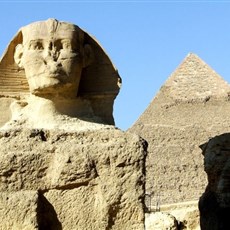
Sphinx
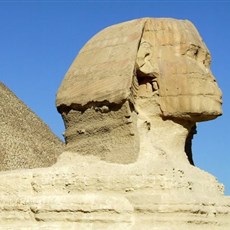
Sphinx
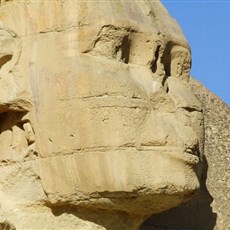
Sphinx
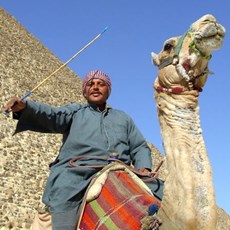
Giza
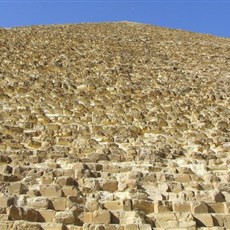
Great Pyramid